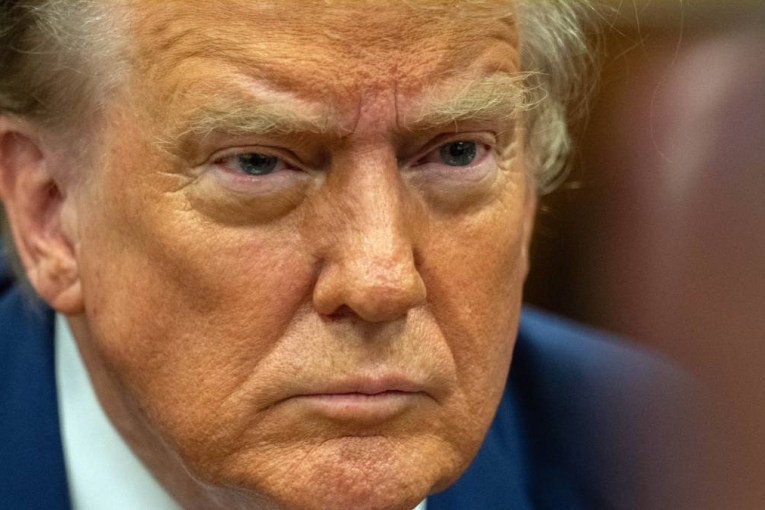Trump pushes for Ginsburg replacement ‘without delay’ as election battle looms
A fierce political battle is looming over the future of the US Supreme Court, with Donald Trump saying he’d quickly name a successor to liberal Justice Ruth Bader Ginsburg, a move that would tip the court further to the right.
For months, the election contest has centred on the president’s handling of the coronavirus but in a flash, Ginsburg’s death on Friday (local time) added new weight to the election.
Her death gives Mr Trump, who is seeking re-election on November 3, a chance to expand the court’s conservative majority to 6-3 at a time of a gaping political divide in America.

The death of Justice Ruth Bader Ginsburg has been swiftly followed by talk of her replacement. Photo: Getty
As grief-stricken Americans gathered at makeshift memorials to mourn the death of the liberal, feminist icon Mr Trump tweeted:
“We were put in this position of power and importance to make decisions for the people who so proudly elected us, the most important of which has long been considered to be the selection of United States Supreme Court Justices.
“We have this obligation, without delay!”
.@GOP We were put in this position of power and importance to make decisions for the people who so proudly elected us, the most important of which has long been considered to be the selection of United States Supreme Court Justices. We have this obligation, without delay!
— Donald J. Trump (@realDonaldTrump) September 19, 2020
Ginsburg, the senior liberal justice, died at age 87 of complications from metastatic pancreatic cancer after 27 years on the court.
Mourners heralded Ginsburg’s groundbreaking legal career and expressed dark worries about the future of the country.
“I am heartbroken,” actor Jennifer Lopez wrote on Instagram.
“She was a true champion of gender equality and was a strong woman for me and all the little girls of the world to look up to.”
Crowds gathered outside the steps of the US Supreme Court in Washington clutching candles, flowers, signs, and young children.

Mourners place flowers, messages, and mementos at a makeshift memorial in front of the US Supreme Court. Photo: Getty
In New York, Governor Andrew Cuomo unveiled plans to erect a statue of Ginsburg in New York City’s Brooklyn borough where she was born.
A trailblazing women’s rights lawyer before she joined the court in 1993, Ginsburg – popularly known by her initials RBG – emerged as an unlikely pop icon in recent years, her image emblazoned on coffee mugs, T-shirts and children’s books.
She spent her final years on the bench as the unquestioned leader of the court’s liberal wing and became something of a rock star to her admirers.
Young women especially seemed to embrace the court’s Jewish grandmother, affectionately calling her the Notorious RBG, for her defence of the rights of women and minorities, and the strength and resilience she displayed in the face of personal loss and health crises.

The ‘Notorious RGB’ became a feminist icon. Photo: Getty
Those health issues included five bouts with cancer beginning in 1999, falls that resulted in broken ribs, insertion of a stent to clear a blocked artery and assorted other hospitalisations after she turned 75.
She resisted calls by liberals to retire during Barack Obama’s presidency at a time when Democrats held the Senate and a replacement with similar views could have been confirmed.
Ginsburg was a mother of two, an opera lover and an intellectual who watched arguments behind oversized glasses for many years. She was a stickler for following the rules.
She argued six key cases before the court in the 1970s when she was an architect of the women’s rights movement. She won five.
Following her death, Bill Clinton said, “Her 27 years on the Court exceeded even my highest expectations when I appointed her.”

U.S. Supreme Court Justice Ruth Bader Ginsburg is sworn in as U.S. President Bill Clinton looks on 10 August 1993. Photo: Getty
Besides civil rights, Ginsburg took an interest in capital punishment, voting repeatedly to limit its use. During her tenure, the court declared it unconstitutional for states to execute the intellectually disabled and killers younger than 18.
Ginsburg authored powerful dissents of her own in cases involving abortion, voting rights and pay discrimination against women.
She said some were aimed at swaying the opinions of her fellow judges while others were “an appeal to the intelligence of another day” in the hopes that they would provide guidance to future courts.
“Hope springs eternal,” she said in 2007, “and when I am writing a dissent, I’m always hoping for that fifth or sixth vote – even though I’m disappointed more often than not.”
Election battle looms

Democrats fear the political battle to replace Ginsburg will distract attention away from Donald Trump’s handling of COVID. Photo: Getty
Facing the prospect of losing both the White House and the Senate, some Republicans view the Supreme Court vacancy as one of the few avenues remaining for Mr Trump to galvanise supporters beyond his most loyal core of supporters.
“It’s hard to see how this doesn’t help Trump politically,” said veteran Republican strategist Alex Conant.
“Biden wants this election to be a referendum on Trump. Now it’s going to be a referendum on whoever he nominates to the Supreme Court.”
Multiple Republicans close to the White House believe Mr Trump will likely nominate a woman, who could serve as a counterweight of sorts to Joe Biden’s choice of running mate Kamala Harris, who would be the first woman to serve as vice president.
Senate Majority Leader Mitch McConnell pledged to quickly bring to a vote whomever Trump nominates. But he faces potential division within his own ranks, including from Senators Mitt Romney of Utah, Lisa Murkowski of Alaska, Susan Collins of Maine and Cory Gardner of Colorado.
Democrats are enraged by McConnell’s pledge to move forward, especially after he blocked President Barack Obama from appointing a justice to replace Antonin Scalia nine months before the 2016 election.
That decision cast a long political shadow, prompting Pete Buttigieg, the former South Bend, Indiana, mayor who mounted a spirited bid for the 2020 Democratic presidential nomination, to make expansion of the Supreme Court a centerpiece of his campaign. Joe Biden rejected the idea.
Some Democrats privately concede that the Supreme Court vacancy could shift attention away from the virus, which has been a central element of Mr Biden’s campaign.
Despite that anger, Democrats have little chance of blocking Mr Trump’s pick whose fellow Republicans control 53 of the Senate’s 100 seats.
Barack Obama himself on Saturday called on Senate Republicans to honour what he called that “invented” 2016 principle.
“A basic principle of the law — and of everyday fairness — is that we apply rules with consistency, and not based on what’s convenient or advantageous in the moment,” Mr Obama said in a statement.
“The rule of law, the legitimacy of our courts, the fundamental workings of our democracy all depend on that basic principle.”
Even before Ginsburg’s death, Mr Trump had a potential shortlist of nominees which includes two women jurists: Amy Coney Barrett and Barbara Lagoa, according to a source close to the White House.
Barrett has generated perhaps the most interest in conservative circles.
A devout Roman Catholic, she was a legal scholar at Notre Dame Law School in Indiana before Trump appointed her to the Chicago-based 7th Circuit in 2017.
Lagoa has served on the 11th US Circuit Court of Appeals for less than a year after being appointed by Trump and confirmed by the Senate on an 80-15 vote.
Prior to that she also spent less than a year in her previous position as the first Latina to serve on the Florida Supreme Court.
The two justices already appointed by Mr Trump were Neil Gorsuch in 2017 and Brett Kavanaugh in 2018.






